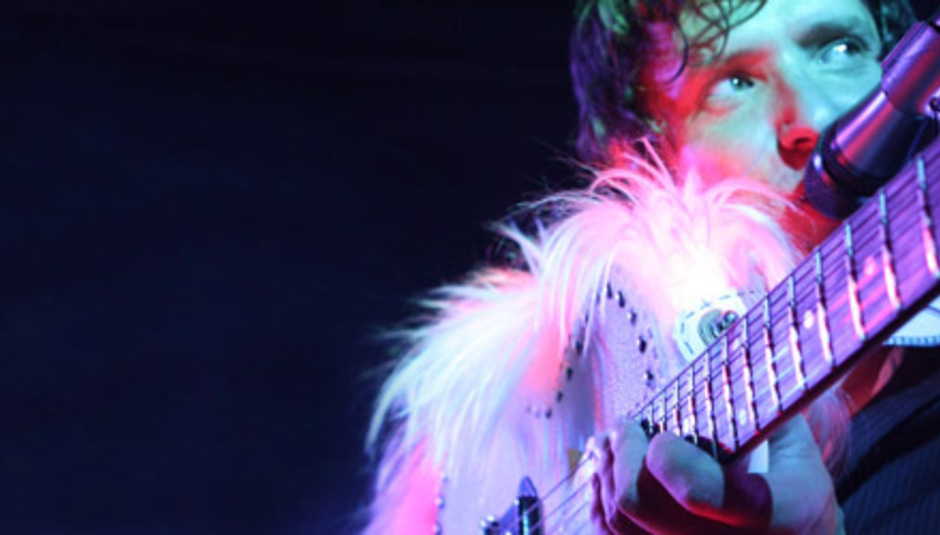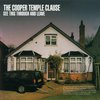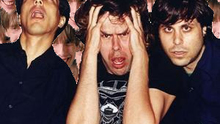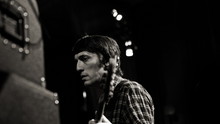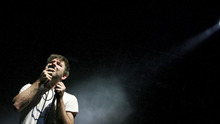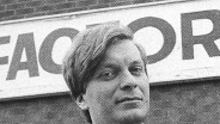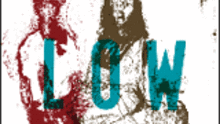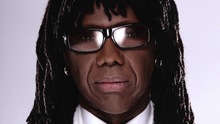Dancing on treadmills, writing for the New York Times and getting excited over hand bell choirs aren't the extra-curricular activities of your average rock band. Nor is spending months working with a team of engineers on a gigantic marble-run-slash-domino-chase-type contraption that culminates in paintball guns shooting you in the face.
In keeping with their tradition of non-conformance, OK Go parted ways with Capitol in March after ten years; setting up their own label – Paracadute – to better serve their desire to “make stuff” that subverts the major label mould.
With future plans that seem to involve doing everything, working with everyone, inventing new art forms, and building the Lego Millennium Falcon set he just bought, front man and chief visionary Damian Kulash is eager to start on the band's fourth record soon, too.
He's a few minutes late for his 10am breakfast date with DiS - in an Italian restaurant close to the Hollywood Hills – due to a broken scooter. But talking at a million words an hour between bites of Breakfast Pizza (don't tell Jamie Oliver), he quickly makes up for lost time.
DiS: Was the transition from major label to self-run indie as effortless and easy as you've made it look?
Damian: Yes and no. It's sort of like our workload has shifted from trying to be the squeaky wheel at the label, you know, always being like 'we need you to do this, we need you to do this, we need money for this', to actually just having to do all those things now.
It's certainly a lot of work, but for me it's a much more fulfilling and satisfying type of work, because you get something done and it's done. It used to be that getting something done meant calling someone over and over and over again and hoping it gets done.
We had to hire a bunch of people and y'know, essentially build a small company. It's good. I'm really happy.
Do you think you could have done it without the learnings of a decade on a major label?
Yes it would have been possible... but I think we'll do a much better job because of our experiences. Being on a major label for the last ten years is like... it's so political and so complicated and so full of little hooks and loops and ridiculous caveats and stuff, that certainly having experience with them has been valuable.
I ran an indie label when I was fifteen through seventeen and released seven records. The model then was: pay for a record to get made, ship it to stores, see what happens. It was a tiny indie run out of my bedroom... And basically this is still run out of my bedroom, but we also have three full time employees, and consultants helping us get things different places, and major distribution. The differences between the two experiences is so vast.
It's like, these days major labels don't really do anything that you can't replicate independently. It just takes a bunch of work to do it. It used to be that major distribution was the only distribution, and major radio promotion was the only radio promotion, and all these things were sort of like their secret formula. But all the people who used to work at major labels have all been fired and started their own companies now, so all the same services exist – you just have to hire them independently. So knowing what those things are, how much they're worth, what you should spend money on and what you shouldn't and stuff, for us at least, has only come through being on a major label.
Was there a specific moment or turning point when you decided to go independent and quit the label?
Well I'm not really allowed to talk about the specifics, but it just became really clear that there's a fundamental logical different between what we're trying to do and what they're good at doing.
Let me take a broader view on this. We as a culture have for a few generations now sort of understood music to be recorded music. That what a song is, is a specific recording. Like this song that we're hearing? This is the song. The live version is a promotion for this. The video for it is a promotion for this. The actual act of songwriting itself is sort of just work you do to get to this. That works fine from an industrial perspective, because you have something you can sell, something you can distribute, you have a tradable commodity. But from a creative perspective, this isn't new ground any more, and it's really fun to play in new ground.
We still love writing and recording songs, but we also like making videos, we also like doing projects with dance troupes, we also like playing concerts and there's no reason for us that the recording itself is the only piece of value in what we're doing. It made for a non-stop battle with the label because we're like 'look at all these great things we have!' and they're like 'that one's worth something and the rest of them aren't'. We need a different model because we're doing a different thing.
Do you think major labels still serve a purpose, and would you still recommend new bands to seek that ever-elusive major label deal?
Very situation dependent, but basically no I wouldn't recommend it. The reasons for signing with major labels traditionally have been threefold: promotion, distribution and funding. Distribution you can now do entirely without a major label, promotion you can now do entirely without a major label – I mean, it takes work, but you can probably do a better job than they can because you know who you are and what you want and how you want to be perceived. The one thing that you can't really do on your own is investment, unless you happen to have a shit-ton of money.
So the reason to sign with a major label at all, is that they have a bunch of money. If they can take the financial risk for you, then yeah, sure, sign with a major the label. The problem is though that they make so little money now.
What about the '360' deals that seem to have become the new standard?
From a numbers perspective, you can't argue with it. Say there's 10 different income streams that bands might make money off of: like merchandising, touring, licensing, etc... The only one that clearly died in the last decade – I mean, a lot of them are having trouble – but the only one that clearly died was record sales. So you can understand, if all the other income streams are still making money, the people who are putting up the money need to see the back end of it somehow.
But if you're in a band and you've watched how myopic and self-defeating record labels have been for the last ten years, the last people you'd want running any of the rest of your business is them. They got so powerful that the industry built itself around their expectations and their power, so when things changed they just fought the change. Each individual decision, you can sort of see why they made it. But in the long form now they've just written themselves into oblivion.
Do you foresee other signings to Paracadute in the future?
Not soon. I could see it happening eventually, but it's certainly not the aim. The business stuff is satisfying in service of the creative stuff. I would find it very hard to do all the businessy stuff for something that didn't feel like my creative baby. I can imagine collaborating with other bands or finding other bands that I was so excited about that it still felt right. But we certainly aren't looking to start the new record empire.
Obviously viral videos made a pretty major difference to your personal experience of the music industry, but how much do you think they've affected the music industry as a whole?
I think it's changed it pretty significantly. I'm the most distorted perspective you could possibly have on that, so who knows.
I don't particularly look at it from the perspective of, what is this doing for the music industry, because as soon as you say the music industry, you wind up sort of back in the logic that the music industry is record sales. It's kind of like how has the internet helped telegraph sales. Well, it hasn't really. It's helped communication. It's helped all the things that the telegraph was there for... I think viral video and digital distribution and digital space as an art space has done amazing things for creative people, whether that's musicians or artists or anyone. Clearly the internet has eroded the traditional business model for musicians, but I think it's offered incredible new opportunities.
Where do you think OK Go would be if it weren't for viral videos?
We'd be making things. The internet has provided an incredible playground, but if that one didn't exist we'd be in another one. It's like asking a painter 'what would you do if canvas didn't exist?' Well, you'd probably paint on something else. At root I think the animating principle of our lives, if I may be so pretentious, is chasing the thrill of making things.
And I guess more specific than just making stuff, it's communicating from the gut. What's so great about music is that you can communicate such intense and multi dimensional emotions that you could never get at with logical thought. I could sit and talk to you all day long and never get to the sense of melancholy that a song could have in a split second; or better yet the sense of these fifty dimensional emotions where it's like, totally blissful and melancholy and sexy or something – like, things that shouldn't go together.
I think we go for the same thing with the videos. It's a different set of feelings, but when they work there's this kind of sense of excitement and wonder, that it's a non-verbal communication that hits you in the gut. I think that would be the thing we'd be chasing no matter what, just through a different medium.
Are you going to stick to the promise of a video for every song on the album?
Well, it was our publicist who promised videos for every song on the album...! The only things that would stop us from continuing is the desire to just move on to something else faster, or just availability of resources. A lot of our video ideas are not all that cheap, so we have to find sponsors for them or we have to find money somehow. It'll be between three and five more depending on how things line up.
We have projects in the line with several different collaborators, and sometimes that might take a month, sometimes it might take a year. The normal label style is the single comes out on this date so we have to have the video a month before that. Ours is like, play around! And when it's done it's done!
Are there any musicians you'd like to collaborate with on forthcoming projects?
Yeah - whenever I meet a spectacular musician, I start scheming a way to do something together. There's an electronic musician in New York named Neil Voss who I'm hoping to maybe do some remixes with or maybe do some recording. I'm also a really huge fan of Rostam [Batmanglij] from Vampire Weekend – I'm close friends with his older brother, strangely – and think that the Discovery record, the one he did with the guy from Ra Ra Riot, is one of my favourite records from the last few years, it's so so good.
Are there any specific creative thoughts someone else had that you wish were yours?
Yes. Everything.
Everything the Pixies ever did, everything Prince ever did, everything the Beatles ever did. I'm such a veracious music fan that we could spend hours just going through all the songs and all the bands we wish we had been.
Do you know David Foster Wallace? He's a writer I'm a big fan of, and I think the thing that makes me feel like just straight up creative envy, is his writing. Especially his essays, actually. One of my favourite pieces by him is 'Authority And American Usage'. It's a review of a grammar book, essentially, and he manages to explain the fundamentals of democracy, and how emotionally difficult actually maintaining a true democracy is; along with the sort of only really sort of insightful, ethical take on abortion that I've ever read; along with a totally searingly accurate breakdown of how writing works and how communication works and how creativity works. His clarity of thought is overwhelming. With each sentence you can't tell whether or not he's just said the thing you always thought but couldn't actually put in words, or if he just said something so clearly that he made you think it was your own thought. It's amazing.
You've written a bunch of newspaper columns about music and politics, and forged a pretty sweet position for yourself in terms of getting your voice heard on issues. Is that something quite important to you?
Yes. I grew up in D.C. with this hyper-political rock'n'roll all around me, and it never occurred to me that people would actively avoid politics because they were worried about their fans or something like that. I feel like there's a dialogue you're having with people musically, like, you want people to feel the gut of your songs, and then there's the dialogue you're having with people intellectually and you want them to hear the weight of your point.
It's like a relationship – the music is the kissing and the politics are the talking. I certainly know what a foxy girl you'd love to kiss looks like, but you wouldn't want that relationship to last long if the conversation was shitty. Music doesn't need to have that side necessarily. You don't have to see it all the time. But I can say there are very few musicians who I just don't respect at people whose music I get totally obsessed with. I think it's hard not to tie it all together.

